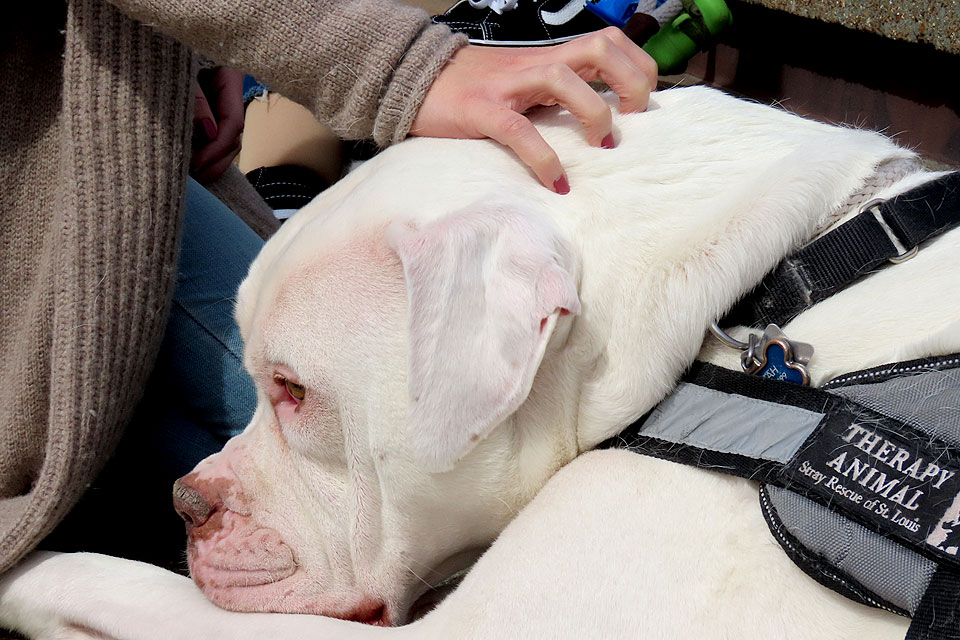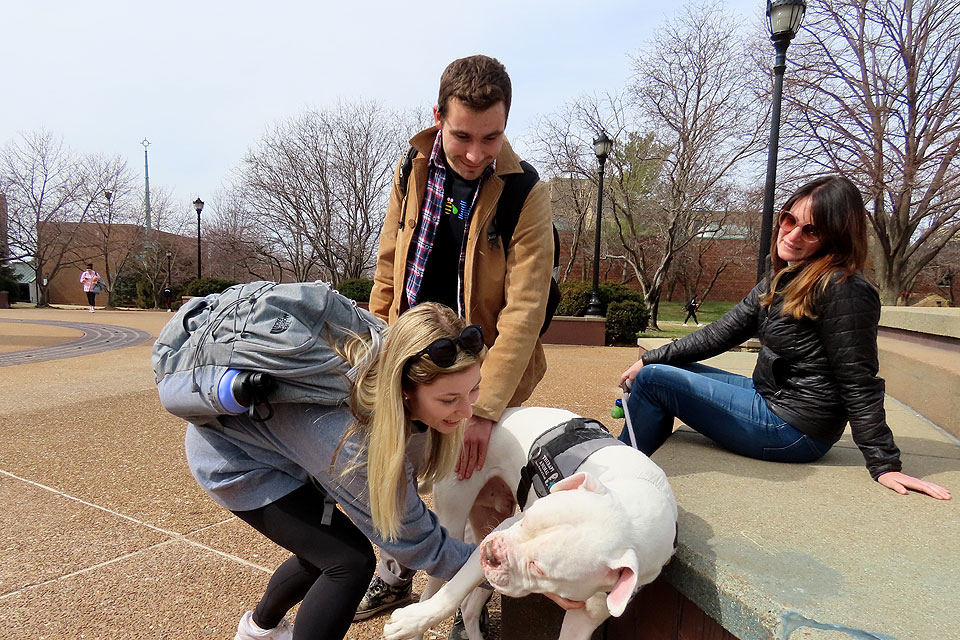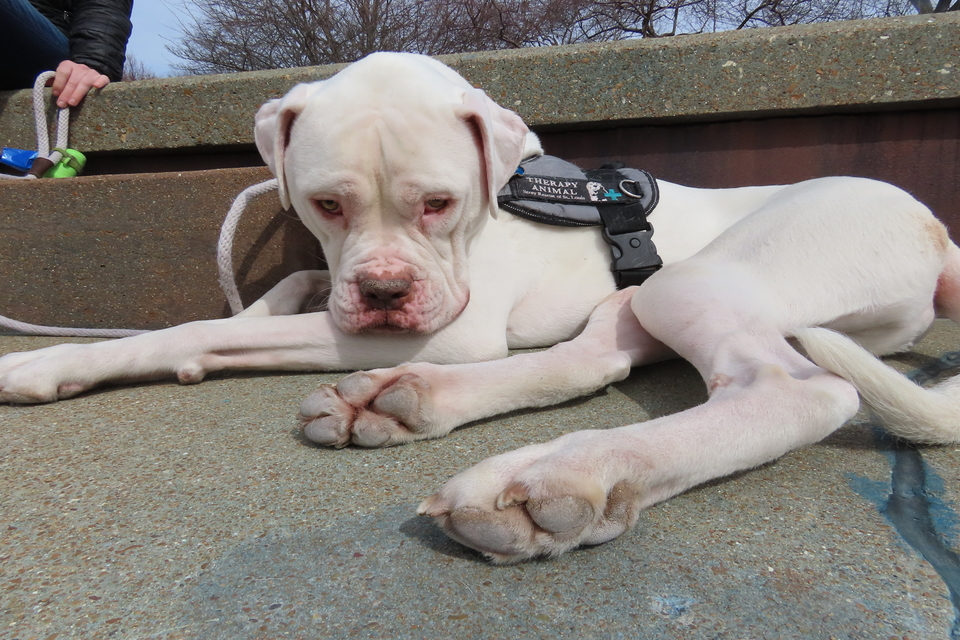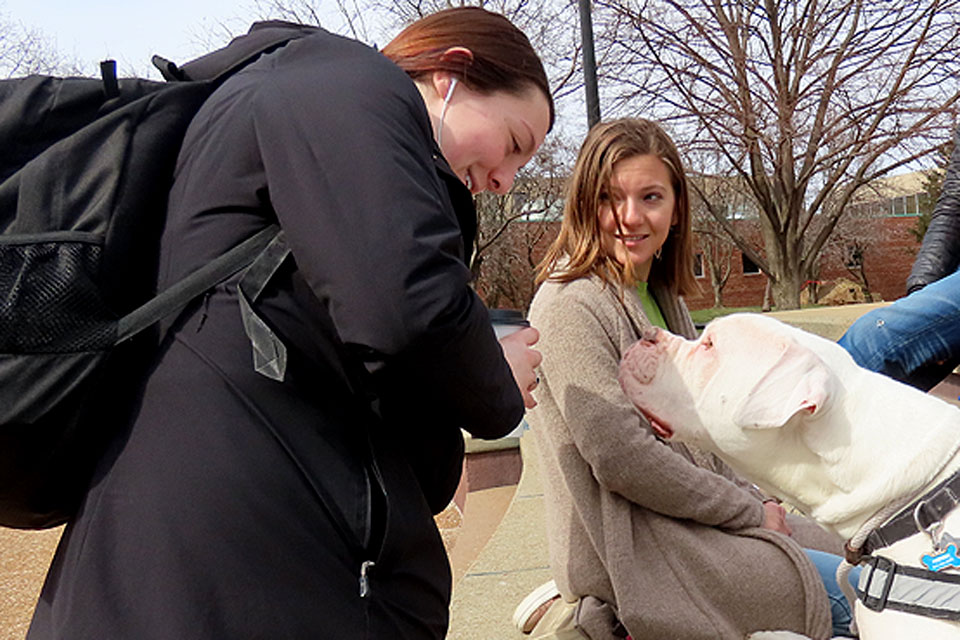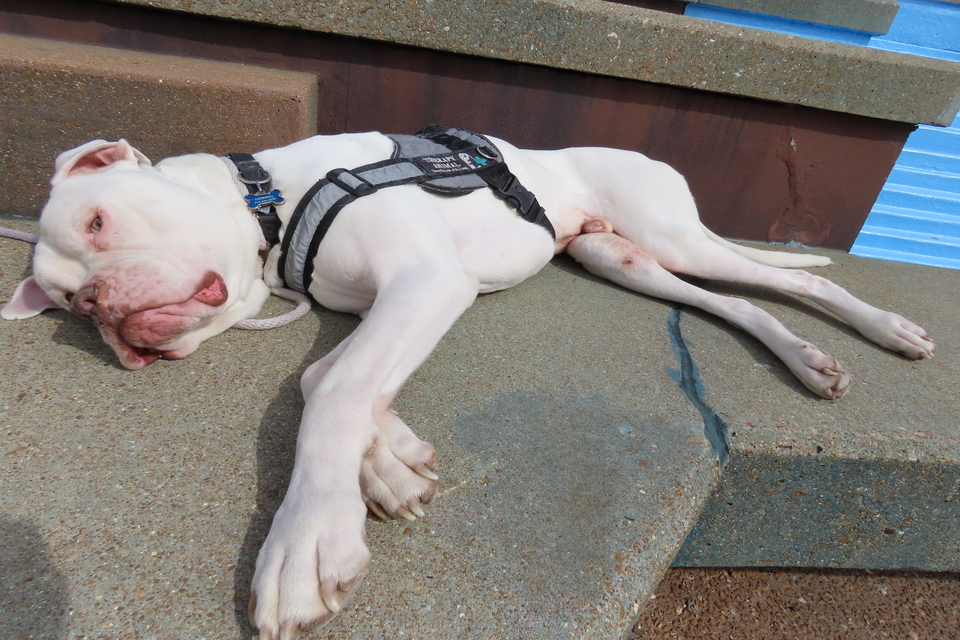Cura in Mind: SLU's Hoonah Provides Canine Comfort to Students
He’s “part dog, part unicorn,” and when Saint Louis University students need him, he’s always there to help.
The pandemic has put his outreach and on-campus interactions on hiatus. And just like us, Hoonah, SLU's resident therapy dog, is going a little stir crazy without work and different humans to spend time with. He’s eager to get back to work and see the students he loves.
Before the pandemic, Hoonah, the University’s resident therapy dog, held regular office and “Yappy Hours” as part of his work helping Billikens care for their mental health, together with his fellow staff members in SLU’s University Counseling Center (UCC).
As wellness – mental, physical, emotional and spiritual – becomes an increasingly visible issue on campuses across the country, the SLU community has stepped in and stepped up to care for their fellow students, faculty and staff members with new programs, resources and opportunities to connect in the spirit of cura personalis.
Nationally, the incidence and awareness of mental health and wellness issues has increased on college campuses. The Chronicle of Higher Education, among others, has highlighted the rise in student mental health needs in recent years.
Since coming to SLU, Hoonah has provided healing through his presence in counseling sessions and at outreach events, offering students and UCC clients support and a way to ground themselves as they work with UCC therapists. Hoonah’s specialty is helping clients dealing with trauma.
“He has an idea and everything,” Jennifer Scott, Hoonah’s handler and coordinator of case management and student-athlete services, said. “He was on campus the first day I had him.”
In 2016, Scott had been researching the ways therapy dogs can support college students. With support from Steven Byrnes, Psy.D., director of the UCC, she reached out to colleagues at Stray Rescue of St. Louis. They had the perfect future Billiken in mind.
“He came to work that first day.”
Hoonah’s Journey to SLU
Abandoned on the steps of Stray Rescue of St. Louis as a puppy, Hoonah, who turned five in May, spent months in a foster setting before joining the Puppies for Parole Program. The program is a partnership between Stray Rescue and the Missouri Department of Corrections that pairs dogs and prisoners. Dogs participating in the program train with their handlers as service or therapy animals.
While Hoonah was originally slated to be trained as a service dog, a hip dysplasia diagnosis altered his path. Trained as a therapy dog instead, Hoonah graduated and returned to a Stray Rescue foster family.
When Scott called Stray Rescue in 2019, Hoonah found his home with her and at SLU.
A Dog for and With Others, at SLU and Beyond
As a trained therapy dog, Hoonah would spend Wednesdays at the UCC and out and about on campus for “Yappy Hour” near the Clock Tower. He’s a valuable partner, Scott explained, because he can reach students in a unique way. Since the pandemic, he’s mainly at home but he still makes a cameo or two in outreach videos and telehealth appointments.
“Dogs are a great tool for grounding someone,” Scott explained. Hoonah can help students tackling traumatic, stressful or upsetting aspects of their mental health issues by helping them shift away from disassociation and into the moment.
To make Hoonah a more effective member of SLU’s staff, he and Scott participate in monthly online continuing education courses to keep his skills sharp.
A student who can pet Hoonah or talk to him can also more easily embrace working in a treatment setting if the person is resistant or intimidated by the UCC’s therapeutic setting. Even online his presence in the background is a tool for creating a more welcoming and comfortable experience for students who are new to online therapy.
Hoonah has helped students engage with outreach and educational activities related to Mental Wellness Week, drawing them in to learn more about how to stay healthy and how to seek help on campus if they need it. The pair has also visited residence hall floors, Greek life meetings and events for SLU’s student-athletes.
Yappy Hours, casual opportunities to spend time with Hoonah, have also offered students, staff and faculty members from the SLU community a chance to enjoy spending time with him and to lighten their loads – whether it’s a bad day or stress over an exam or assignment.
Not content to help only SLU students, Hoonah and Scott have also volunteered with the Center for Animal Rescue and Enrichment (CARE STL), a local animal rescue group, and its work with the St. Louis City Circuit Court’s Detention Alternatives Program. As volunteers, Scott and Hoonah have helped kids participating in the program learn about humane animal care with a focus on helping the children develop healthy social and emotional skills.
“Whoever needs to pet a dog, who needs to interact with something like him, that’s what he’s here for,” Scott said.
The pandemic has put this program on hold as well, but future plans have the program starting back up and expanding to more at-risk groups in the City of St. Louis.
What Billikens Should Know About Hoonah
He’s here for you, even if he's not back on campus yet.
He’s here for everyone, and that’s the most important thing for everyone to know.
He’s a resource for every student.
If you’re having a stressful day, or a bad one, you will be able come and pet him when he returns.
And, when you get to bring him treats again, make sure they’re vegan.
Nationally and at home here at SLU, mental health and wellness issues have become increasingly visible. In the spirit of cura personalis, the University community's call to “care for the individual person” and to respect the dignity of each person as a child of God, Cura in Mind, a limited series, is shining a light on the ways that Billikens are helping students cope, manage and thrive mentally and emotionally on campus.
The series aims to give those working on mental health issues on campus a chance to reach out to let Billikens know that there are friends, faculty and staff members who are here to help.
Story by Amelia Flood, University Marketing and Communications


















